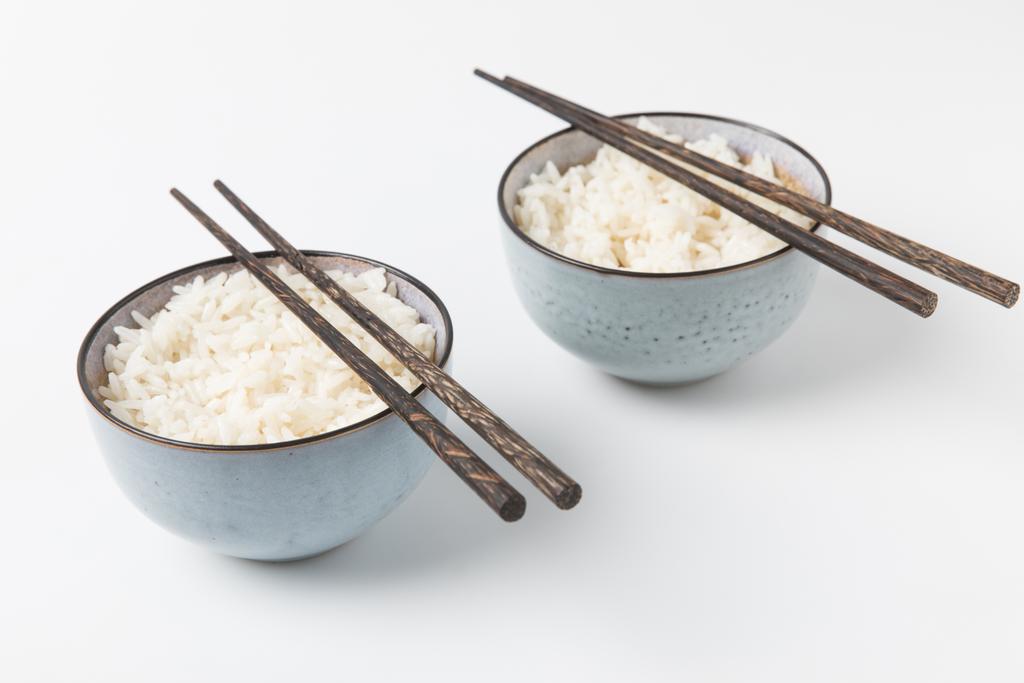Rice has different nutritional values: depending on the variety, the information differs slightly. We show you the different types of rice and their nutrients at a glance.
The nutritional values contained in rice depend on the variety and the growing area. Rice comes in a wide variety of colors and shapes. In addition to long grain, medium grain and short grain rice, there are also black and red rice varieties.
The nutritional values of the grains are as different as their appearance. In our large rice overview you can see all the nutritional values at a glance.
1. Parboiled long grain rice – the nutritional values
Long grain rice is the classic rice variety. This elongated white rice type includes basmati rice and jasmine rice. Long-grain rice is particularly widespread in German cuisine because it is very filling and ideal for rice pans and the like. However, it contains very few nutrients. When buying, you should make sure that the rice was grown under fair working conditions.
Rice nutritional values per 100 g:
Carbohydrates: 77.3 g
Protein: 7.3 g
Fat: 0.9g
Dietary fiber: 0 g
Calories: 347 kcal
2. Nutritional Values of Basmati Rice
Basmati means “fragrant” in Hindi, alluding to the strong aroma of this long-grain rice. Basmati rice originally comes from Afghanistan and is grown there on the edge of the Himalayan mountains.
Nutritional values per 100 g:
Carbohydrates: 78 g
Protein: 9 g
Fat: 0.9g
Fiber: 2.2 g
Calories: 354 kcal
3. Nutritional Values of Patnareis
Patnareis bears the name of the Indian city where it is grown. What is special about it is the relatively hard grain, which is why you can use it primarily for dishes where the rice should have a grainy consistency. The grain is very long and thin, but Patnareis also has relatively few nutrients.
Rice nutritional values per 100 g:
Carbohydrates: 77.3 g
Protein: 7.3 g
Fat: 0.9g
Fiber: 1g
Calories: 347 kcal
3. Jasmine Rice – the nutritional values
You may also know jasmine rice as fragrant or Siam rice. It is mainly grown in Thailand, but also in Vietnam and Italy. This type of rice smells of jasmine and has a special taste of its own. Because it is slightly sticky, jasmine rice is often used in Thai dishes in particular.
Rice nutritional values per 100 g:
Carbohydrates: 78.8 g
Protein: 7.0 g
Fat: 0.7g
Fiber: 0.7 g
Calories: 350 calories
4. Nutritional Values of Black Brown Rice
Black brown rice is one of the whole grain rice varieties and has a slightly nutty taste. Today it mainly comes from China and Italy, but black rice is also grown in the Austrian Burgenland.
Rice nutritional values per 100 g:
Carbohydrates: 67.6 g
Protein: 9.8 g
Fat: 3.1g
Fiber: 1.9 g
Calories: 346 kcal
5. Nutritional values of risotto rice
Essential for creamy risotto: risotto rice, an Italian starchy rice variety. It comes in both short grain and medium grain rice. Its main growing area is in Italy, where it has such euphonious names as Arborio, Vialone or Carnaroli.
Rice nutritional values per 100 grams:
Carbohydrates: 87.6 g
Protein: 7 g
Fat: 0.6g
Dietary fiber: 0 g
Calories: 362 kcal
6. Nutritional values of rice pudding
Rice pudding is one of the short grain rice varieties. As its name suggests, it is mostly used for sweet milk dishes. It is cooked directly in the milk. The starch dissolves in the milk and thickens it. This is how the pulpy consistency of the rice pudding is created.
Rice nutritional values per 100 grams:
Carbohydrates: 87.6 g
Protein: 7 g
Fat: 0.6g
Dietary fiber: 0 g
Calories: 362 kcal
7. Nutritional Values of Sushi Rice
Sushi rice comes from Japan, where it is called Kome. Small-grained and particularly starchy, it gives sushi the necessary sticky consistency. Apart from that, it is also used for other rice dishes.
Rice nutritional values per 100 g:
Carbohydrates: 78 g
Protein: 6.7 g
Fat: 0.5g
Dietary fiber: 1.4 g
Calories: 345 calories

